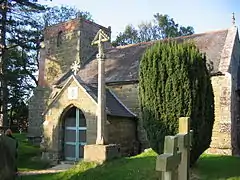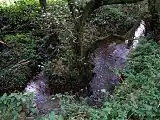Somersby, Lincolnshire
Somersby is a village in the East Lindsey district of Lincolnshire, England. It is situated 6 miles (9.7 km) north-west from Spilsby and 7 miles (11 km) east-north-east from Horncastle. The village lies in the civil parish of Greetham with Somersby (where the population is listed) in the Lincolnshire Wolds, a designated Area of Outstanding Natural Beauty; the parish covers about 600 acres (2.4 km2).
| Somersby | |
|---|---|
 St Margaret's Church, Somersby | |
 Somersby Location within Lincolnshire | |
| OS grid reference | TF343727 |
| • London | 120 mi (190 km) S |
| Civil parish | |
| District | |
| Shire county | |
| Region | |
| Country | England |
| Sovereign state | United Kingdom |
| Post town | Spilsby |
| Postcode district | PE23 |
| Police | Lincolnshire |
| Fire | Lincolnshire |
| Ambulance | East Midlands |
| UK Parliament | |
Tennyson


Alfred, Lord Tennyson, Poet Laureate, was born and brought up in Somersby, the son of the rector, and the fourth of twelve children. When he wrote The Babbling Brook he was referring to a small stream here.[1] Other features of the local landscape are claimed as features mentioned in Tennyson's poetry,[2] such as "Woods that belt the grey hillside" and "The silent woody places by the home that gave me birth". In 1949 the copper beech was reported to be still standing at the former rectory which was mentioned in In Memoriam: "Unwatched, the garden bough shall sway,/The tender blossom flutter down,/Unloved, that beech will gather brown,/This maple burn itself away." The same poem also mentions leaving "the well-beloved place / Where first we gazed upon the sky".[3] In such poems as The Lady of Shalott[4] Tennyson uses the word "wold" for a hill in a sense found in Lincolnshire.[5] Tennyson wrote a few poems (e.g. "The Church-warden and the curate") in the local dialect.
Church
The Anglican parish church is dedicated to Saint Margaret. It is an ancient sandstone building, constructed some time before 1612, and restored between 1863 and 1865. It seats about 80 people. Alfred, Lord Tennyson, was baptised in St Margaret's.
Stone from the now disused Somersby Quarry, an outcrop of Spilsby Sandstone, was used to repair the church.[6] This soft stone is a khaki-green colour when exposed to weathering.[7]
Somersby Grange
Somersby Grange is a Grade I listed Georgian manor house which stands adjacent to the rectory where Tennyson was born.
References
- Alfred, Lord Tennyson. "The Brook". Catrine-Ayrshire.co.uk/Brook. Retrieved 25 April 2011.
- The King's England: Lincolnshire (Hodder & Stoughton Ltd., 1949, 1952) under the entry for Somersby.
- All these quoted in the article mentioned.
- Tennyson, Poems, first published in 1842, Oxford University Press, 1956
- Eilert Ekwall, The Concise Oxford Dictionary of English Place-Names.
- "St Margaret's, Somersby". The birthplace of Tennyson. St Margaret Somersby PCC. Archived from the original on 16 October 2013. Retrieved 13 October 2013.
- "Spilsby Sandstone". Lexicon of Named Rock Units. British geological survey.
External links
 Media related to Somersby, Lincolnshire at Wikimedia Commons
Media related to Somersby, Lincolnshire at Wikimedia Commons- East Lindsey District Council website